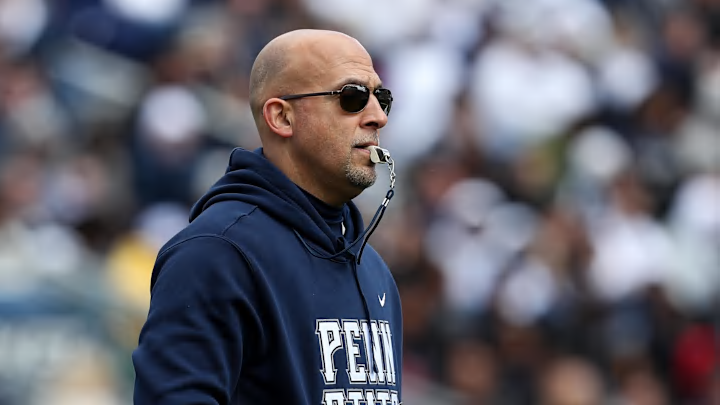There was a time when Penn State football was synonymous with longstanding success in college football. Unfortunately, the program is associated with other things now. It's been James Franklin's job to clean up the perception of the program after the Jerry Sandusky scandal.
He seems to be doing a questionable job of that.
On Tuesday, a former team doctor with the Penn State football program testified in open court that Franklin tried to "influence medical decisions" including pressuring doctors to prematurely clear injured players. But that was the least concerning thing Franklin was accused of doing.
Dr. Pete Seidenberg claimed Franklin tried to get him to medically disqualify a player who had recently attempted suicide so that his scholarship spot would be open for another player.
James Franklin allegedly tried to get suicidal player cut
Here's how John Luciew of PennLive.com described the testimony:
"The suicidal player was still receiving treatment in short-term psychiatric care when Seidenberg testified Franklin and then-Penn State athletic director Sandy Barbour wanted the player medically disqualified from the team.
"Seidenberg testified this would have meant the player would lose his Penn State scholarship so Franklin could offer it to another player during the upcoming offseason.
"Seidenberg testified he and Dr. Scott Lynch, then Penn State’s director of athletic medicine and orthopedic consultant to the football team, declined to follow Franklin’s and Barbour’s request. Seidenberg said it would have been the equivalent of disqualifying a player with a torn ACL before he received surgery."
Seidenberg's testimony was part of a lawsuit brought by a former Penn State doctor who asserts he was fired in 2019 because he would not “allow a coach to interfere with his medical treatment and return to play decisions.”
If true, there's no other way to describe Franklin's behavior than disgusting. He is charged with the care of the student athletes who call Penn State their home. Treating a player going through a mental health crisis so callously is the opposite of his duty.
Seidenberg indicated this incident happened during Franklin's early years as Penn State's head coach. He was hired in 2014. Four years earlier a former Penn football player committed suicide while suffering from the effects of CTE. Presumably, the incident at Penn State occurred not long before Washington State quarterback Tyler Hilinski committed suicide in 2018.
College football coaches should place importance on mental health and player safety. The testimony in court on Tuesday suggests Franklin doesn't. That's a problem.
Franklin already had some questionable skeletons in his closet. He was accused of contacting the victim of a gang rape by Vanderbilt football players after the sexual assault. He changed his story about whether not he had seen video of the rape itself. At the very least he made his players believe he had.
This won't do anything to help his reputation.
If you or someone you know is struggling with depression and considering self-harm, the National Suicide Prevention Lifeline provides free and confidential support, 24/7. You can call 1-800-273-8255 to be connected.
